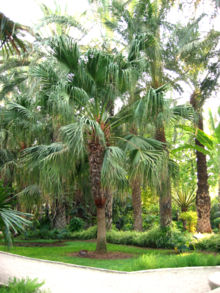Livistona chinensis, the Chinese fan palm[2] or fountain palm,[3] is a species of subtropical palm tree of east Asia. It is native to southern Japan, Taiwan, the Ryukyu Islands, southeastern China and Hainan. In Japan, two notable populations occupy islands near the coast of Miyazaki Prefecture, Aoshima and Tsuki Shima.[4] It is also reportedly naturalized in South Africa, Mauritius, Réunion, the Andaman Islands, Java, New Caledonia, Micronesia, Hawaii, Florida, Bermuda, Puerto Rico and the Dominican Republic.[1][2]
| Livistona chinensis | |
|---|---|

| |
| Scientific classification | |
| Kingdom: | Plantae |
| Clade: | Tracheophytes |
| Clade: | Angiosperms |
| Clade: | Monocots |
| Clade: | Commelinids |
| Order: | Arecales |
| Family: | Arecaceae |
| Tribe: | Trachycarpeae |
| Genus: | Livistona |
| Species: | L. chinensis
|
| Binomial name | |
| Livistona chinensis | |
| Synonyms[1] | |
| |

Description
editVegetative characteristics
editLivistona chinensis can attain heights of about 9 to 15 m (30 to 50 ft) and a spread of 4 m (12 ft). The leaves are fan shaped.[2]
Cultivation
editThe palm is cultivated as an ornamental tree in gardens and conservatories.[5] It is hardy in USDA zones 9-11, tolerating temperatures down to about 22 °F (−6 °C).[6][7]
This plant can become a weed, or in some ecosystems an invasive species, in places such as Bermuda,[5] Hawaii,[8] Florida wetlands and on some Caribbean Islands.
References
edit- ^ a b c "Livistona chinensis". World Checklist of Selected Plant Families (WCSP). Royal Botanic Gardens, Kew. Retrieved 6 March 2017.
- ^ a b c "Chinese Fan Palm". Palm Trees. Archived from the original on 17 March 2012. Retrieved 6 March 2017.
- ^ USDA, NRCS (n.d.). "Livistona chinensis". The PLANTS Database (plants.usda.gov). Greensboro, North Carolina: National Plant Data Team. Retrieved 6 March 2017.
- ^ "Exploring for Palms in Japan" (PDF). 14 February 2017. University of California Division of Agriculture and Natural Resources. Retrieved 24 December 2021
- ^ a b "Chinese Fan Palm". Department of Environment and Natural Resources (Bermuda). Retrieved 6 March 2017.
- ^ Tom MacCubbin, Georgia Tasker (2002). Florida Gardener's Guide. Cool Springs Press. p. 113.
- ^ Sunset Western Garden Book. Sunset Publishing. 2007. p. 450.
- ^ "GDP by State". BEA, U.S. Department of Commerce. Retrieved 2013-08-01.